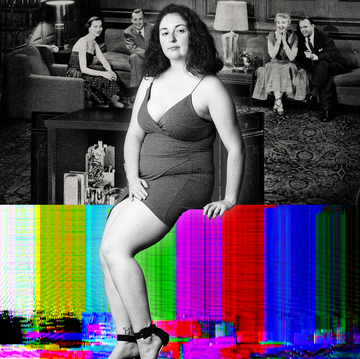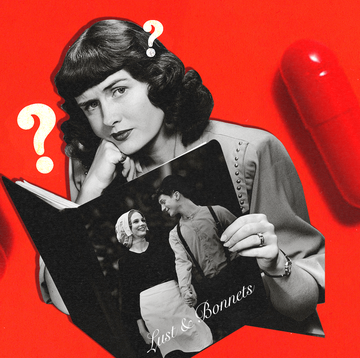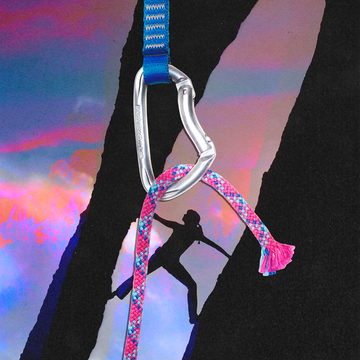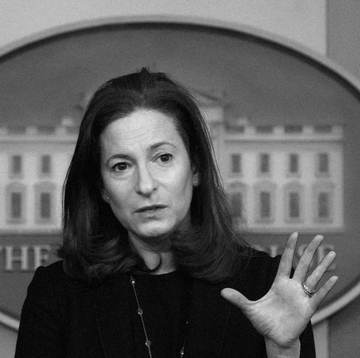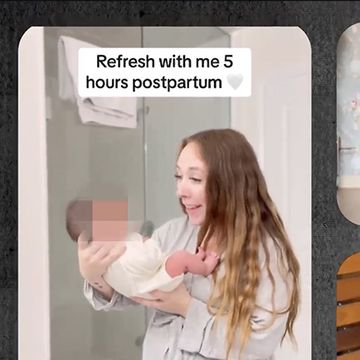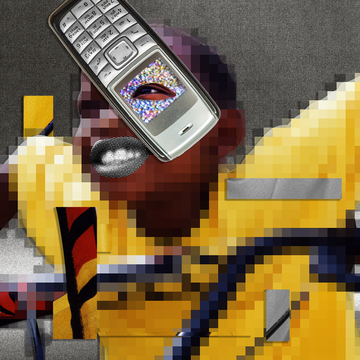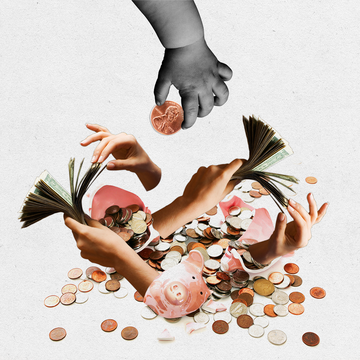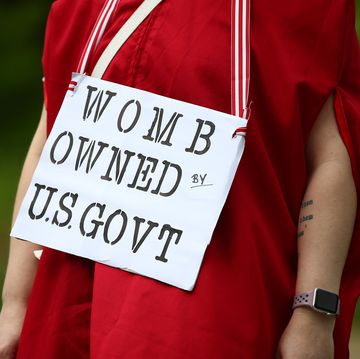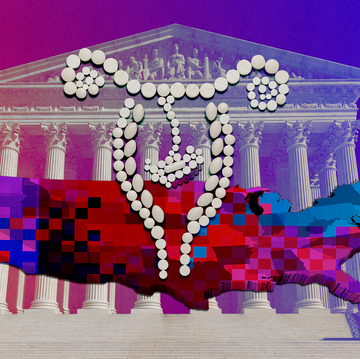This is just the latest of a long list of articles I've written for Cosmopolitan.com about gun violence over the last three years. I am tired of writing about the same topic again and again and knowing that nothing ever changes -- not after kindergarteners were mowed down in the classroom, not after 58 concert-goers lost their lives and hundreds (thousands?) of people more now live the rest of their lives having seen unimaginable human slaughter right in front of them. This is not normal, and yet in the United States death by gun is the norm. I cover this topic on repeat because, unlike in every other developed nation not at war, mass gun murders happen here on repeat.
Enough. Our problem with gun violence is beyond extreme, and so the solutions must be, too. Let's not dab around the edges of a massive wound by stopping at limits on the cheap "bump stocks" that turn semi-automatic weapons into machine guns or even efforts to repeal the total insanity that is open-carry (although we should do that too). Let's do what's necessary to make our country a sane and safe place: radically regulate guns.
This is no easy task in a nation obsessed with guns, and where the biggest gun obsessives say their arsenals aren't just for protection or play, but fundamental to their sense of freedom and liberty as Americans. But it's not impossible.
One path would be to repeal the Second Amendment. Constitutional amendments are written on paper, not in stone; the founders intentionally created a mechanism for changing them should the necessity arise. The necessity has long since arisen. Americans are rightly skeptical of any efforts to tinker with the Constitution. But we've done it before, most notably with Prohibition, repealing the amendment that outlawed alcohol. That amendment did more harm than good, fueling organized crime and compromising public health. The Second Amendment has been far worse for the country: an average of 27 Americans die every day from gunshots. By contrast, you are about as likely to be killed by a gun in Japan as to be struck dead by lightning.
Proponents of the Second Amendment insist that they need their guns to protect them from government tyranny. To start, repealing the Second Amendment would not make guns illegal, it would simply remove the presumptive (and increasingly expansive) right to them. It would free up federal, state, and city governments to actually regulate firearms -- cities with high levels of violent crime could ban handguns, for example, or states could allow ownership of heirloom pieces and institute stricter licensing, safety, and background check requirements for newer ones. And there's no evidence that a largely disarmed population -- or a population where the government better controlled who had access to guns, and which kinds of weapons were permitted -- is a less free one. The United States has the largest number of guns per capita; number two on the list is Yemen, not exactly a bastion of freedom and democracy, let alone personal safety (even before the current U.S.-approved Saudi bombing campaign). Also in the top ten are democracies with very strict gun regulations that also have larger-than-average numbers of guns per capita (Switzerland, Finland) and thoroughly oppressive states where freedom and human rights are faraway concepts and guns are plentiful (Saudi Arabia, Iraq). Free and functional democracies are distributed throughout the rest of the list, all with much lower rates of gun ownership than the U.S. -- the U.K., the Netherlands, Ireland, Australia, and on and on.
There seems to be no correlation, in other words, between gun ownership and freedom from tyranny. But there is a correlation between guns, lax gun laws, and gun deaths.
Another way to get to radical regulation if full repeal isn't in the cards is to emulate the NRA. Liberals with money who are sick of gun deaths could heavily fund long-game effort to return Second Amendment jurisprudence to its roots. The Second Amendment has been radically and expansively interpreted over the past decade or so, far beyond what the Framers intended. This radical reading of the amendment has been fueled by both the NRA's legal machine and Republican-appointed conservative judges. The idea that individuals have a nearly unfettered right to own guns is very, very modern. For most of American history, guns were heavily regulated, and the Supreme Court thought that was just fine. Undoing this egregious misreading will take decades. It means funding legal scholars to hone the most effective arguments for curtailing gun ownership and funding organizations that can develop effective legislative and litigation strategies -- crafting better laws and using the justice system to go after bad actors (for example, the gun companies that make big bucks on our culture of violence). It means a Democratic Party that pays much more attention to judicial appointments in the lower court, and focuses appointments on judges who read the Second Amendment as it's actually written -- that is, providing for a well-regulated militia -- and not just the second half of the sentence, which includes the right of the people to bear arms (something that has only recently been interpreted as a virtually unlimited right to individual gun ownership). It means an effort to change the laws that make it nearly impossible to sue gun manufacturers, and those that have made guns a part of daily life -- open- and concealed-carry laws that let fanatics bring guns into churches and schools, for example.
It means taking the time to build political will and shift the culture around guns in America.
That is where you and I come in. Politicians don't just respond to what a majority of their constituents believe; they listen to the loudest voices (and the biggest donors and most effective lobbying groups). If we socially turn against gun culture, it's easier for gun-skeptical officials to introduce and pass long-overdue restrictions on guns. As it stands, politicians -- even on the left -- swear their fidelity to the Second Amendment because the American right, led by the NRA, has made it politically toxic to do anything less. This does not have to be permanent. The right-wing work to misread the Second Amendment and make "gun culture" a beloved, if deadly, component of American life did not happen just in NRA offices. It was a massive social project, and it took decades to change not just the law, but political views. This is hardly unprecedented, and surely we can shift in the other direction. "Repealing the Amendment may seem like political Mission Impossible today, but in the era of same-sex marriage it’s worth recalling that most great causes begin as improbable ones," writes Bret Stephens, a conservative columnist, in a New York Times piece about repealing the Second Amendment. He's right. The push for same-sex marriage rights didn't come from the courts. It took decades of work to decrease discrimination against LGBT folks, to the point of eventually stigmatizing homophobia, creating a nation that would be receptive to the eventual Supreme Court decision saying same-sex couples have a right to wed.
With guns, we do not have to accept that America is a nation of mass shooters and the gun-happy dupes who enable them. We can begin to stigmatize things like gun hoarding – owning an arsenal of weapons – as well as being the kind of gun owner who buys pieces that are solely purposed for mass human destruction (rather than, say, a hunting rifle you use to kill the food you eat). Parents should refuse to allow their children to play in homes where there are guns. Women and men should condition staying overnight at a partner's house on there not being any unlocked guns around; those dating men should be especially careful to avoid gun owners, given that domestic violence touched too many people's lives, and when you add a gun it's more likely to turn deadly. We can stop being so polite that we're uncomfortable to ask the people in our lives about guns in their homes, and act to protect ourselves and our children accordingly. We can create an anti-gun cultural landscape right now, enabling our lawmakers and law enforcers to craft and enforce the laws and policies we need to limit gun violence. We can invest our resources to work the long game of reform, particularly in holding gun companies to legal account.
We have the power to adequately regulate these machines specifically designed to kill. It's time we used it.
Jill Filipovic is the author of The H-Spot: The Feminist Pursuit of Happiness. Follow her on Twitter.

Jill Filipovic is a contributing writer for cosmopolitan.com. She is the author of OK Boomer, Let's Talk: How My Generation Got Left Behind and The H-Spot: The Feminist Pursuit of Happiness. A weekly CNN columnist and a contributing writer for the New York Times, she is also a lawyer.


